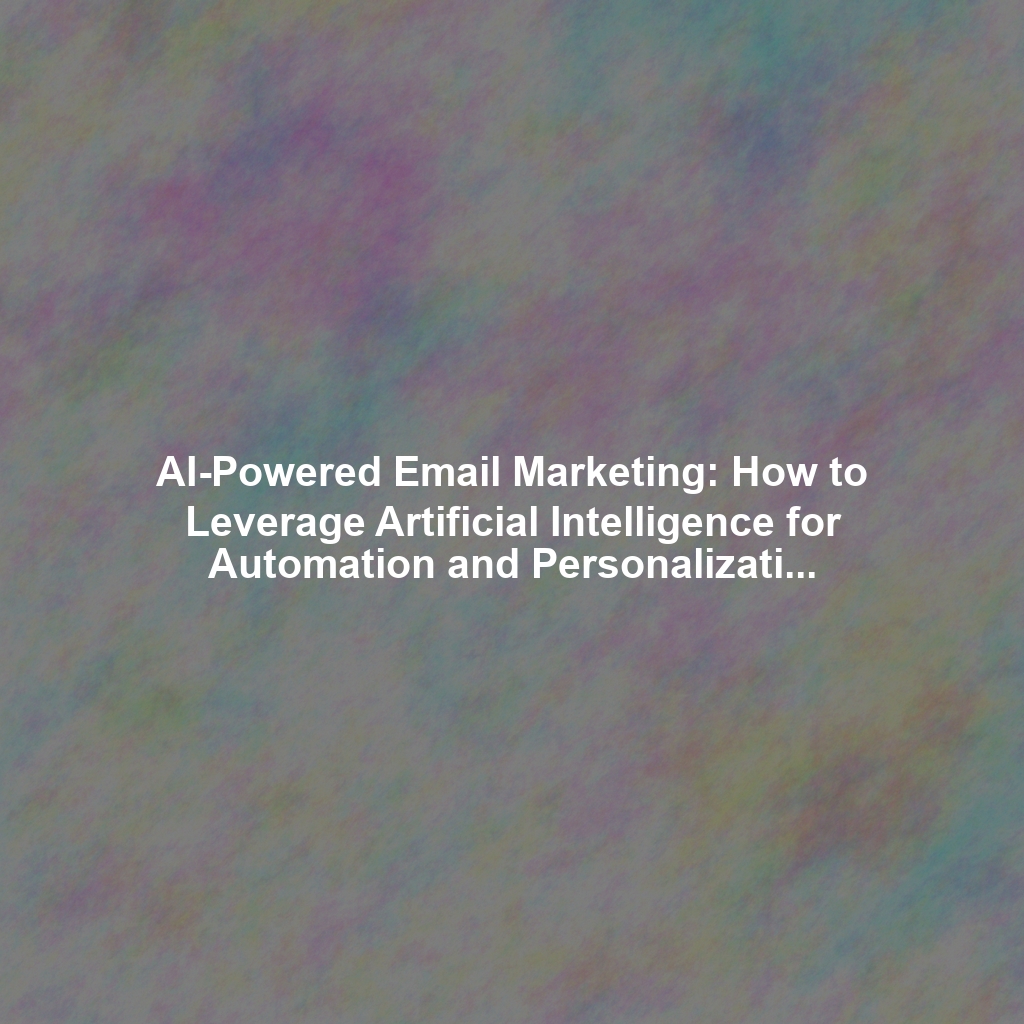Email marketing, a cornerstone of digital communication, is undergoing a significant transformation thanks to the advancements in Artificial Intelligence (AI). No longer just about sending mass emails, today’s email marketing leverages AI to deliver highly personalized and automated experiences, boosting engagement, conversions, and ultimately, ROI. This article explores the practical applications of AI in email marketing, examining how it’s changing the game and what you need to know to stay ahead.
The AI Revolution in Email Marketing
AI isn’t just a buzzword; it’s a powerful tool capable of analyzing vast amounts of data to understand customer behavior and predict future actions. In email marketing, this translates to smarter campaigns, more effective targeting, and increased customer satisfaction. By automating tasks and personalizing content at scale, AI empowers marketers to achieve results previously unattainable.
AI-Driven Subject Line Optimization
The subject line is the gatekeeper to your email. AI can analyze historical data, A/B testing results, and even current trends to suggest subject lines that are more likely to grab attention and increase open rates. AI algorithms can identify the keywords, phrases, and emotional tones that resonate most with your audience, resulting in subject lines that are both relevant and compelling.
Example: Instead of guessing, an AI tool might suggest variations like: “Exclusive Offer Just For You!” vs “Don’t Miss Out! 50% Off Ends Tonight” based on subscriber segments and past campaign data.
Predictive Segmentation: Reaching the Right People
Traditional segmentation relies on static data like demographics and purchase history. AI goes further by predicting future behavior. It analyzes browsing history, website activity, email engagement, and other data points to identify subscribers who are most likely to convert, churn, or engage with specific products. This allows you to create highly targeted segments and tailor your messaging accordingly.
Example: An AI algorithm might identify subscribers who haven’t made a purchase in 6 months but have recently browsed specific product categories. These subscribers can be added to a “Re-engagement” segment and targeted with personalized offers and recommendations.
Personalized Product Recommendations: Driving Sales
AI can analyze customer data to recommend products that are relevant to individual subscribers. This goes beyond simply recommending products that are similar to past purchases. AI can also consider browsing history, wish lists, and even social media activity to identify products that the subscriber is likely to be interested in, even if they haven’t explicitly expressed interest. This hyper-personalization dramatically increases click-through rates and conversion rates.
Example: If a subscriber frequently views running shoes on your website, AI can automatically include recommendations for new running shoe models or related accessories (e.g., socks, water bottles) in their next email.
Automated Email Workflows: Streamlining Communication
AI can automate various email marketing tasks, freeing up marketers to focus on strategy and creativity. This includes tasks such as sending welcome emails, abandoned cart reminders, order confirmations, and follow-up emails. AI can also optimize the timing of these emails based on individual subscriber behavior, ensuring that emails are delivered at the most opportune moment.
Example: An abandoned cart workflow can be enhanced by AI to dynamically adjust the discount offered based on the value of the items in the cart and the subscriber’s purchase history. Subscribers with higher purchase values might receive a larger discount to incentivize them to complete their purchase.
AI-Powered Email Marketing Tools and Platforms
Several platforms now integrate AI to enhance their capabilities. Here are a few notable examples:
- Persado: Focuses on generating AI-powered marketing language that drives action.
- Phrasee: Specializes in AI-driven subject line optimization and copywriting.
- Mailchimp: Offers AI-powered features like predictive segmentation and product recommendations.
- HubSpot: Provides AI-powered insights and automation capabilities within its marketing automation platform.
- Sendinblue: Uses AI to optimize send times and improve deliverability.
Ethical Considerations of Using AI in Email Marketing
While AI offers tremendous potential, it’s crucial to consider the ethical implications of its use. Transparency, data privacy, and avoiding bias are paramount.
- Transparency: Be upfront with subscribers about how you are using AI to personalize their experience.
- Data Privacy: Adhere to data privacy regulations like GDPR and CCPA, and ensure that you are protecting subscriber data.
- Avoiding Bias: Be aware that AI algorithms can sometimes perpetuate existing biases. Regularly audit your AI models to ensure fairness and accuracy.
- Consent: Always obtain explicit consent before collecting and using subscriber data for AI-powered personalization.
Conclusion
AI is reshaping the landscape of email marketing, offering unparalleled opportunities for automation and personalization. By leveraging AI-powered tools and strategies, marketers can create more engaging, relevant, and effective email campaigns. However, it’s essential to approach AI with a strong ethical compass, prioritizing transparency, data privacy, and fairness. As AI continues to evolve, its role in email marketing will only grow, making it a critical skill for marketers looking to thrive in the future.
 Skip to content
Skip to content

